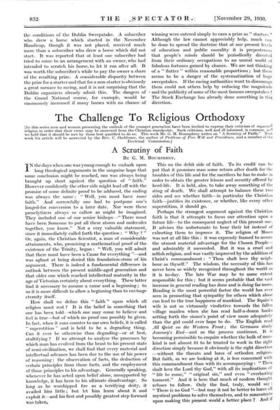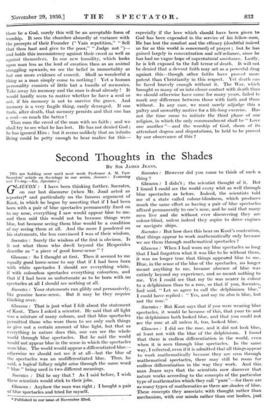The Challenge To Religious Orthodoxy
[In this series men and women presenting the outlook of the younger generation have been invited to express their criticism of organized religion in order that their views may be answered from the Christian standpoint. Such criticism, well and ill informed, is common, and we hold that it should be met by those best qualified to do so. This week Mr. G. M. Boumphruy writes on "A Scrutiny of Faith." Next week his article will be answered by the Rev. C. Shebbeare, the author of Problems of Free Will and Providence, and a member of the
Doctrinal Commission.]
A Scrutiny of Faith
BY G. M. BOUMPIIREY.
IN the days when one was young enough to embark upon long theological arguments in the sanguine hope that some conclusion might be reached, one was always being brought up short against the question of "faith." However confidently the other side might lead off with the promise of some definite proof to be adduced, the ending was always the same : "Well, you must have some faith." And sorrowfully one had to postpone one's longed-for conversion to a later date. Nor were these proselytizers always so callow as might be imagined. They included one of our senior bishops—" There must have been Someone to put all these atoms and molecules together, you know." Not a very valuable statement, since it immediately called forth the question : " Why ? " Or, again, the Christian Scientist, a man of considerable attainments, who, promising a mathematical proof of the existence of the Trinity, began : "Well, you will admit that there must have been a Cause for everything "—and was aghast at being denied this foundation-stone of his argument. There is indeed a fundamental difference in outlook between the present middle-aged generation and that older one which reached intellectual maturity in the age of Victorian certainty about everything. These latter find it necessary to assume a cause and a beginning ; to us it is more difficult to allow a beginning than to envisage eternity itself.
How shall we define this " faith " upon which all religion must rest ? It is the belief in something that one has been told—which one may come to believe and feel is true—but of which no proof can possibly be given. In fact, when it runs counter to our own beliefs, it is called " superstition " and is held to be a degrading thing. Can it ever be otherwise than degrading—or at best, stultifying ? If we attempt to analyse the processes by which man has evolved from the beast to his present state of semi-civilization, we shall find that every material and intellectual advance has been due to the use of his power of reasoning : the observation of facts, the deduction of certain principles from those facts, and the employment of those principles to his advantage. Generally speaking, whenever he has acted upon belief alone, unsupported by knowledge, it has been to his ultimate disadvantage. So long as he worshipped fire as a terrifying deity, it availed him little ; but let him learn about it and exploit it—and his first and possibly greatest step forward was takena
This on the debit side of faith. To its credit can be put that it promises man some return after death for the troubles of this life and for the sacrifices he has to make in order to obtain the greater leisure and security offered by herd-life. It is held, also, to take away something of the sting of death. We shall attempt to balance these two sides and see whether faith—in particular the Christian faith—justifies its existence, or whether, like every other superstition, it should go.
Perhaps the strongest argument against the Christian faith is that it attempts to focus our attention upon a future life—to the consequent neglect of this present one. It advises the unfortunate to bear their lot instead of exhorting them to improve it. The religion of Moses was not at all like this : it was expressly framed to secure the utmost material advantage for the Chosen People— and admirably it succeeded. But it was a cruel and selfish religion, and was vastly improved by the addition of Christ's commandment : "Thou shalt love thy neigh- bour as thyself." The wisdom, the necessity of this has never been so widely recognized throughout the world as it is to-day. The late War may be to some extent responsible for this ; but it seems probable that the vast increase in general reading has done and is doing far more. Reading is the most powerful factor the world has ever seen in promoting that sympathy for others which alone can lead to the true happiness of mankind. The Squire's wife is not so virtuously vindictive towards the fallen village maiden when she has read half-a-dozen books setting forth the sinner's point of view more adequately than the girl could ever hope to do. The English read All Quiet on the Western Freed; the Germans study Journey's End—and so the process continues. It is becoming permissible to enquire whether the bulk of man- kind is not almost fit to be trusted to work in the right direction simply because it obviously is the right direction —without the threats and lures of orthodox religion. But faith, as we are looking at it, is less concerned with this emiunandment than with its accompanying : "Thou shalt love the Lord thy God," with all its implications of "life to come," "original sin," and even "everlasting torment." And it is here that much of modern thought refuses to follow. Only the fool, truly, would say : "There is no God "—but may it not be better to leave all mystical problems to solve themselves, and to concentrate upon making this present-world. a better place I And if
there be a God, surely this will be an aeceptable form of worship. It sees the churches absurdly at variance with the precepts of their Founder (" Vain repetition," "Sell that thou hast and give to the poor," "Judge not ")— and holds this inconsistency against their creed as well as against themselves. In our new humility, which looks upon man less as the lord of creation than as an animal struggling upwards, we see the belief in immortality as but one more evidence of conceit. Shall so wonderful a thing as a man simply come to nothing! Yet a human personality consists of little but a bundle of memories. Take away his memory and the man is dead already ! It would hardly seem to matter whether he have a soul or not, if his memory is not to survive the grave. And memory is a very fragile thing, easily deranged. If one finds, after death, that memory persists and that one has a soul—so much the better !
Thus runs the creed of the man with no faith ; and we shall try to see what he has lost. He has not denied God; he has ignored Him ; but it seems unlikely that an infinite Being could be petty enough to bear malice for this—
especially if the love which should have been given to- God has been expended in the service of his fellow-men. He has lost the comfort and the efficacy (doubtful indeed to far as this world is concerned) of prayer ; but he has gained largely in concentration and self-reliance, since he has had no vague hope of supernatural assistance. Lastly, he is left exposed to the full terror of death. It will not be denied that a devout faith may act as a powerful drug against this—though other faiths have proved more potent than Christianity in this respect. Yet death call be faced bravely enough without it. The War, which brought so many of us into closer contact with death than we should otherwise have come for many years, failed to mark any difference between those with faith and those without. In any case, we must surely adjudge this a paltry and unworthy motive for a life-long exercise. Has not the time come to initiate the third phase of our religion, in which the only commandment shall be "Love one another "—and the worship of God, shorn of its attendant dogma and disputations, be held to be proved by our observance of this ?











































 Previous page
Previous page